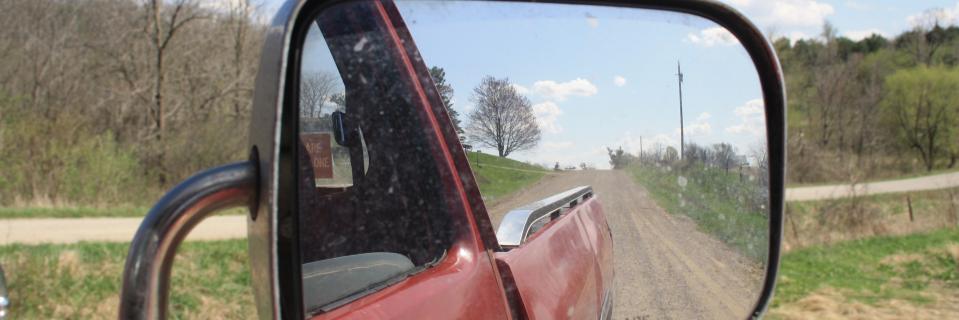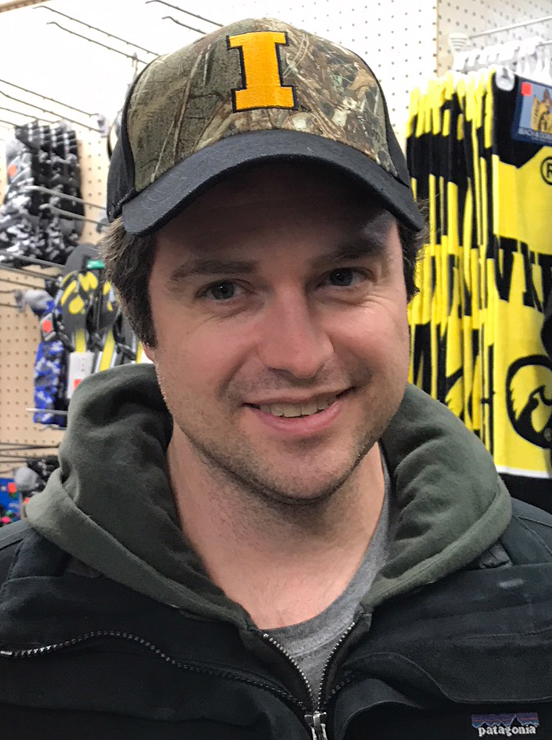As Iowa City expands, it takes longer to break though the outer ring of strip malls, office parks, and housing developments to see a classic Iowa landscape—a pastiche of Grant Wood’s Stone City. But drive a few miles down Highway 1 towards Kalona, and the land clears out to rolling hills that are marked off with farm houses pushed against the road. I’m in the backseat of a mini-van; my arm rests on a red cooler full of sparkling water. My father sits on the other side. Four of his buddies fill up the rest of the van. It’s early morning and we are off to explore southeast Iowa. This is not the kind of extemporaneous road trip I used to take in college: then, planning consisted of inviting someone with a car, buying a case of Genny Cream Ale, and borrowing an E-Z Pass for free tolls.
This trip is more like those I took when I was growing up, when our family drove all over the state. My parents didn’t want to fit the stereotype of Iowa City snobs who never leave Johnson County unless the destination is Europe or Manhattan. I have memories of winning a quarter of a hog at a county fair, the tulip parade in Pella, and lots of festivals ending in “Days”: Beef Days, Sauerkraut Days, Steamboat Days, Sweet Corn Days, and Ice Cream Days. A few years ago, I moved back home after living on the East Coast, and realized most of my Iowa travel memories had faded. My dad would mention an old trip we had taken and I’d blank, or only remember a small detail—like the buffet line of Jello salads at the United Methodist Christmas potluck in Springdale. I decided to start taking my own weekend trips to explore Iowa as an adult. Sometimes I’d travel with my dad, sometimes I’d take a lady friend. Eventually, I suggested inviting some of my dad’s pub buddies. I knew them from when I was growing up, and I had often heard about their road trips to breweries around the state. The trips sounded fun—lots of swearing, drinking, and derision.
The planning for this particular trip started a month ago. Emails went back and forth, containing links for possible places to eat and attractions to visit: Mexican food in Columbus Junction, the Canteen diner in Ottumwa, a new goat cheese farm north of Keokuk. The only stop everyone agreed on was the Lost Duck Brewery.
A brewery seems to be a necessary, but not sufficient, condition for these trips to come together. The Lost Duck is in Fort Madison, a river town along the Mississippi in Southeastern Iowa. This is the poorest region of the state. Over the last 30 years manufacturing has left the state and the agricultural economy has shrunk. Lots of once-thriving small farm and river towns are now desolate: the only buildings bookmarking their Main Streets are a post office or Casey’s gas station. There are exceptions, however, and using a combination of the 1930s Iowa WPA guide, local newspapers, and decades of experience with living in the state, the pub guys and I outline a circuitous route that points us towards the Mississippi.
The van feels relaxed. There is no yelling or bravado. The pace of conversation is similar to a Quaker meeting: no agenda, people speak when moved.
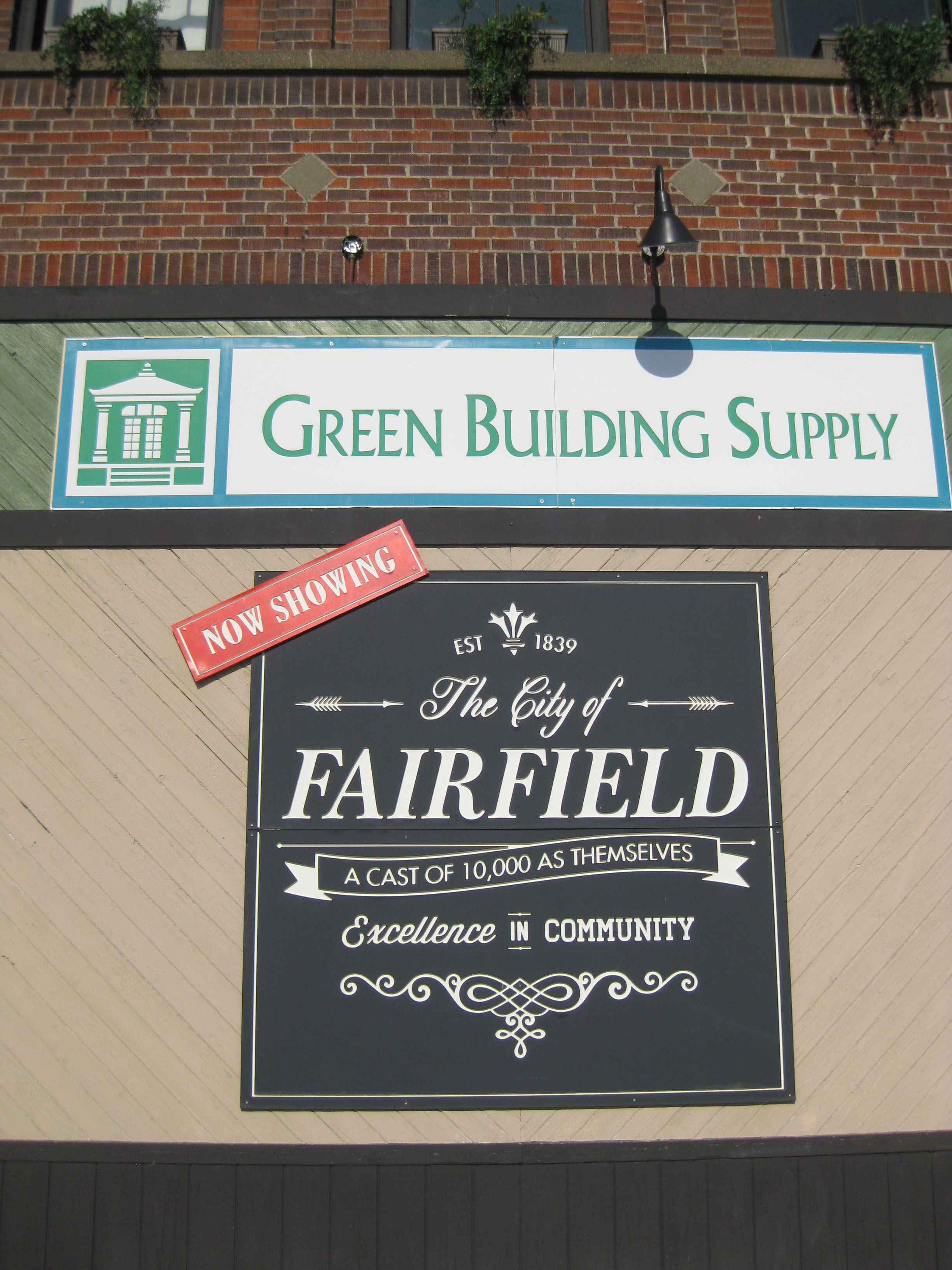
Photo courtesy of Jon Andelson
“Does anyone remember a blonde Norwegian woman that worked at Pleasant Valley? She was a cashier there in the 80s. I think her name was Anna. A real babe. She was really dishy. I mean really dishy.”
“I was probably about 5 years old then,” I reply.
“You would remember her then,” says Brent.
Without turning around, from the front passenger’s seat, Richard says, “You know, Brent, I must say my memory of beautiful women doesn’t extend back that far.” Richard’s cadence is measured, like an old school debater. Everyone in the van laughs.
The query has concluded, but Brent wants the last line: “You guys need to make more space in your brains for beautiful women. She was super dishy.”
The topic of beautiful women from Iowa City days past returns, but is interrupted as Phil points out a stand selling Amish-made furniture. Before I can decide whether I want to get out and look, we’ve passed the stand. Despite the desultory nature of the trip, Phil insists the van continues forward. “It’s not worth stopping. I’m pretty sure those chairs are made in Indiana, anyway.”
We pull over at a gas station in Wellman so Kory, the driver, can look at a map. Cell phone service is spotty, which makes the drive feel more adventurous—even though with Phil’s Iowa knowledge it would be impossible to get lost.
“Fairfield’s the next stop,” says Phil. “I went on a date once with a TM-er. She said she could levitate.”
“Did you see her do it?” I ask.
“No. She wouldn’t let me watch. She made me listen from another room. After ten minutes she said she levitated, but I didn’t believe her. No empirical evidence. We didn’t go out again.”
“You should have turned back there!” barks Phil.
We take the next left, which points us towards Keota.
“Do you remember the farm woman, Cecile? She used to live out here with a cowboy in the late 90s. She baked her own bread in a wood-fired oven. Raised goats. Men were nuts for her.” An hour in and we’ve already covered two decades of Iowa City women. I’m quickly realizing that, despite being the young guy in the van, the group dynamic is familiar. The vocabulary is at a higher level, references are more erudite, but the topics of male conversation are timeless.
A replica of the Maharishi Golden Domes announces Fairfield. A new addition to the school? We pull in but realize we’ve been tricked by an office park crafted to look like a spiritual center. Last time I was in Fairfield was for a tennis tournament at the Parsons College gym. The rumor was the gym was going to be torn down because its entrance did not face east—a requirement for all Maharishi architecture. The gym was saved, however, after a new door was added to the east side of the building. From then on, the tennis courts were spiritually copasetic with the principles of Vastu architecture. On the outside, the gymnasium still looks the same.
“Hey Phil, did you know anyone who played basketball at Parsons?” my dad asks. Phil grew up in Iowa and rumors are he was the first man off the bench on the University of Iowa basketball team in the 60s.
Phil quickly answers: “They had good players. Mostly kids that weren’t good enough to play at U of I.”
From the driver’s seat, Kory adds “My parents used to tell me if I didn’t study hard enough I’d have to go to Parsons.”
Phil interrupts, “They would take anyone that could pay tuition. I think some kids from the Pennsylvania Hershey family went to Parsons.”
In contrast to Keota, downtown Fairfield is alive. The Maharishi buying the college was a boon for the town. More than a few times when I’ve told someone I’m from Iowa the first thing they ask is if I’ve been to Fairfield and seen people levitate.
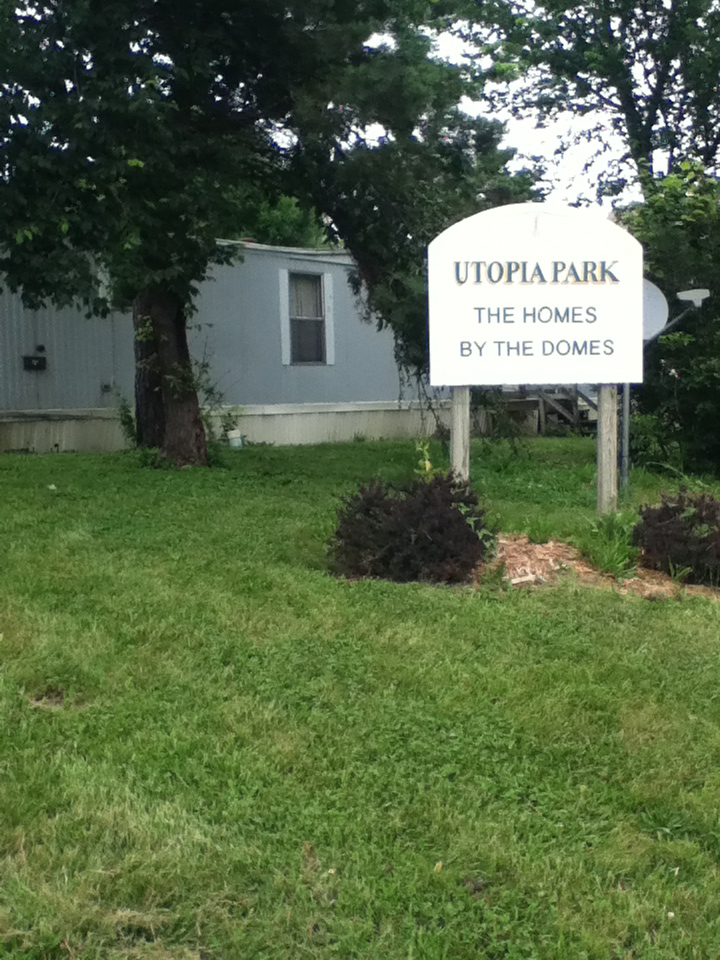
University Housing, Maharishi University of Management. Photo courtesy of Jon Andelson
We pass a new arts center, a fancy stationary store and, posted on a telephone poll, a sign advertising free pistol lessons on Fridays. The homes are grand, with large front porches, turrets, and windows with ornate glasswork on the edges. Although Parsons is gone, Fairfield still feels like a college town. We pass a purple colored house with an organic garden out front. Looks like a Co-op.
“Hey Phil, maybe that TM-er you dated lives here. Want to stop?” Phil ignores Brent’s zinger, a repartee amongst old geezers.
Kory links us back to Highway 1 heading towards Keosauqua to see the Hotel Manning. Expectations are high. Phil claims Mark Twain stayed at the Manning on his comedy tour. I picture a big old historic hotel like the Winneshiek in Decorah, but downtown Keosauqua is desolate. The Manning quietly appears at the edge of the Des Moines River. The structure of the hotel has its features: a classic Western movie balcony running across the second floor with HOTEL MANNING in paint-chipped block letters underneath. However, the hotel feels forgotten, tucked between the river and a cheap roadside motel next door. We take another loop though the town. Other than a couple smokers outside Tillie’s Tap, the streets are empty.
“Anyone want to get out and walk around?” Kory asks.
We haven’t yet been out of the van and I’m ready to stretch my legs. I hope our trip doesn’t turn into one of those European mega bus rides where retirees drive through quaint Austrian villages without setting a foot on the ground.
“What stop is next?” inquires Richard.
“The Dutchman,” answers Kory.
“We should save our energy for The Dutchman then,” replies Richard.
The plan is to stop in Cantril and walk around The Dutchman, a Mennonite version of Paul’s Discount in Iowa City—a local store selling everything from broadsides with trite inspirational quotes to camouflage Iowa Hawkeye baseball hats. As we pull into Cantril, the guys go around and list items they hope to purchase. The objects are quotidian, but the possibility of finding, say, a straw broom at the Dutchman turns an everyday household product into a collector’s item.
Brent leads off, “The Amish make the best paring knives. They last forever. Never lose an edge. I want to buy at least seven.”
“If they last forever, why do you need to buy more than one?” Richard asks.
Brent doesn’t take Richard’s bait to start debating. Kory adds 10 pairs of Eclipser glasses to his wish list. “You never should look directly in the sun,” he advises. I don’t have a wish list, but decide to buy some sort of kitsch souvenir to remember the trip.
Downtown Cantril is one block long, and the Dutchman takes up the whole right side. I step out of the van and the Iowa summer heat hits me for the first time. There is no shade, so everyone heads straight into the store. There is a tacit understanding to reconvene at the van after everyone loads up on supplies. I cool off with a soft-serve ice cream and wander over to a display of Red Ryder BB guns hanging above a collection of small garden gnomes. Unlike most big box stores, the Dutchman is tightly packed, creating a cozy feel. Our crew is efficient and I see Brent with a handful of knives approach a row of Mennonite girls waiting to ring people up. The others follow suit, quickly finding their items, and head outside to the van. Maybe it’s the Mennonite spirit, but the pub guys are fast. I’m the last one in the store and impulsively grab a jar of Amish-made hard boiled eggs pickled in red beet juice. The red color attracts me, but it’s too shiny, like a candy apple. I leave the store and wonder how Amish the eggs really are: the second ingredient on the back of the jar reads red dye number two.
“No more stops till Fort Madison,” Phil declares as we leave Cantril. It’s almost 1 o’clock and lunch takes priority. Kory read about The Fort Diner on a food blog, and starts a discussion of whether anyone will order a Wally burger, the Fort’s featured menu item. We easily spot the diner; it’s across the street from a Fort Madison replica, right alongside the Mississippi. A sign saying “Eat the Fort” sits atop the entrance to a small trailer. Windows run along the side and a menu board with items spelled in black tiled letters rises behind the counter. Inside, the Fort has all the fixings of a classic American diner: a waitress with a deep smoker’s rasp, a white board listing special pies, and a short order cook sweating over a grill and small deep fryer.
The booths hold two people so I, along with Kory and Brent, sit at the counter.
“Only two pieces of key lime pie left, so order now,” the waitress bellows.
Richard orders pie and a Wally burger without hesitation. “Just to let you know, the only thing you’ll be doing after that Wally burger is sleeping,” the waitress says. Richard laughs but, undaunted by the warning, he starts in on the teal colored pie, which arrives first. Richard used to be a weightlifter, and still has a big frame with wide shoulders. If anyone can take down a Wally burger it’s him.
As the rest of the food comes out the waitress offers a rundown of local news starting from the 1950s when employees from the Shafer pen company would line up outside the Fort for lunch, till last year when a couple convicts broke out of the state penitentiary and stopped for a beer before skipping town. We take our time so Richard can work through his pound of well-done beef covered in gravy, mushrooms, and onions, everything a monochrome light brown. He eventually capitulates, but everyone is impressed—less than a quarter of the gravy soaked bun remains. My dad texts his wife a picture of Richard’s Wally burger. She messages back: Gross. Looks like guy food.
After a meal where the only green item consumed was key lime pie, the air-conditioned van makes a welcomed sanctuary. We approach Keokuk from the Illinois side, crossing the Mississippi and following I-96 though Nauvoo. Parts of the road nudge right up against the Mississippi, giving the best view of the trip; I’ve never seen the river so close from a car. Both sides are lined with trees and woodland brush. Across the river, the historic Keokuk lock and dam stands out like a lighthouse.
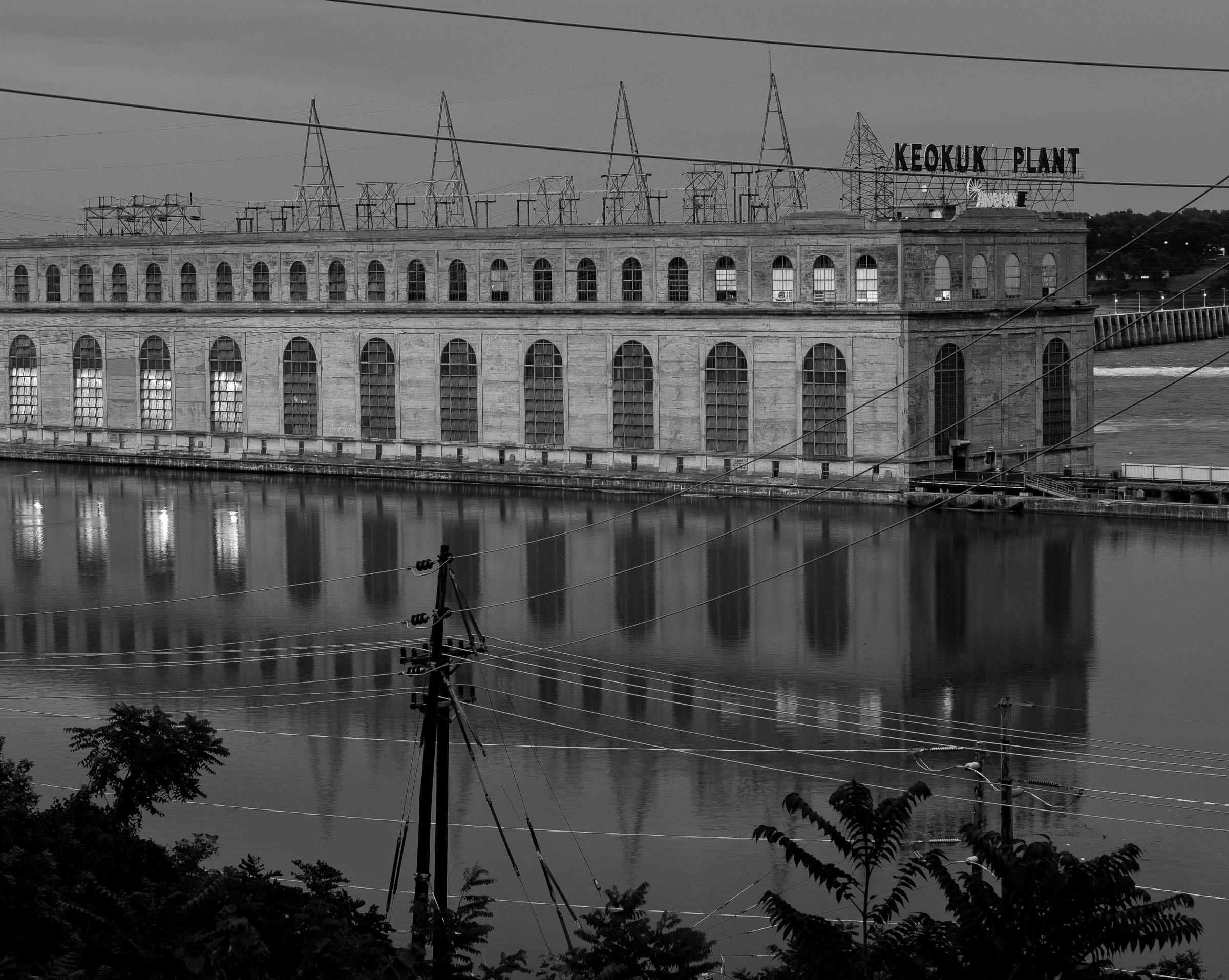
“Keokuk Power,” photo by David Ottenstein
Brent asks the group if anyone knows the correct way to say Keokuk. “I think they drop the kuk. More like, Keo-Kha.”
“Who cares,” Phil says. “The guys from Keokuk were always assholes. That’s never changed. The only thing they’re good at is stock car driving.”
“You never went out with a girl from Keokuk?” Brent asks.
“Ha. If you wanted to get beat up. Keokuk guys saw you were from out of town, they’d tailgate your car till you left. I stuck with Pella girls.” Pella is a small prosperous Dutch town in Iowa. Every year they have a tulip festival celebrating Dutch culture. A few years ago, the festival set a world record for most people dancing in wooden shoes at the same time.
“Did you ever date the Tulip Queen, Phil?” Brent asks.
“Not that I remember,” says Phil.
“You’d remember if you had,” says Brent.
Like many river towns, Keokuk is struggling to keep its downtown alive. Most of the storefronts are empty or filled with chain restaurants and cheap beer bars. We loop down to the railroad tracks and pull up to the historic Keokuk Union Depot. The station, however, stands boarded up as part of a renovation. Brent says we can call a guide to come down and open it up for us, but the Depot’s so far from finished it’s not worth it. In the 40s, when the Zephyr Rocket trains connected cities all over the Midwest, this Depot was probably quite grand. Now a dozen sets of railroad tracks sit empty.
“I’m ready for some beers, let’s go,” announces Kory. No objections. Everyone seems to feel like we’ve seen all that Keokuk has to offer.
We return to Fort Madison for one last stop. A view of the State Penitentiary welcomes us back. We enter the Duck, which we discover is a block away from The Fort diner. The brewery is dead except for a lonely woman drinking alone by the window. The woman watches us, waiting for an invitation. She seems friendly, but Phil doesn’t give her an opening. Inviting women to the beer table is discouraged. Having seen women occasionally join pub group I can see why: they get all the attention as the guys try and impress the ladies rather than indulging in each other’s rants and discussion of medical ailments.
Phil and I walk to the bar and order two mixed samplers. Everyone picks through the beers, taking sips as they work their way around the tray. The beers are colorful and refreshing, but taste the same. The real highlight of the bar is the up-close view of the Mississippi. We watch the river speed by. Conversation pauses for the first time all day; the current commands everyone’s attention.
Brent breaks the silence. “My favorite part was The Dutchman. I wonder if they have a website where I can buy more paring knives.”
“Do we want to stay and have enchiladas at The Elks Club?” Kory asks. “The sign out front says they are having a fundraising dinner tonight.”
“You know, Kory, that Wally burger is still with me,” says Richard. I take some group shots of the table and my dad takes a photo of me and Richard. Having made it to the brewery, I feel like the trip is winding down, and I want some memories that will last longer than the fake Amish eggs. Phil, the trip leader, heads to the minivan parked behind the Fort. “Let’s roll,” he says.
No one argues; we made it to the Duck and it’s time to head home. Kory takes a shortcut to highway 218. The road loops around a large chemical plant surrounded by high wired fences. The plant looks like it should be off the Jersey turnpike, not stuck in the middle of Iowa farmland.
“I think our trip mojo has run out,” says Kory. “Let’s just stick with 218 the rest of the way.”
For the first time all day, the van goes silent. Corn and soybean line both sides of the road, directing the way home. Most people probably wouldn’t consider southeast Iowa a vacation spot, but everyone in the van is content. Lots of these small towns still have life left, even as the population and economy shift to the bigger Iowa cities. It just takes a little more effort and planning to find places other than a Casey’s gas station to explore. Most of the interesting locations are not on Yelp.
The trip is not over, but I’m struggling to not fixate on the end. I remember the guys in the van giving me checks at my high school graduation, and now they are no longer only my dad’s pub buddies, but mine as well. I am hoping we can continue to arrange these trips more often.
We get out of the van grabbing our goods from the Dutchman. As we walk towards the house Phil shouts from the van, “I think we should do Burlington next. It’s supposed to be one of the best spots to watch the solar eclipse. I’ll bring Eclipsers for everyone.”
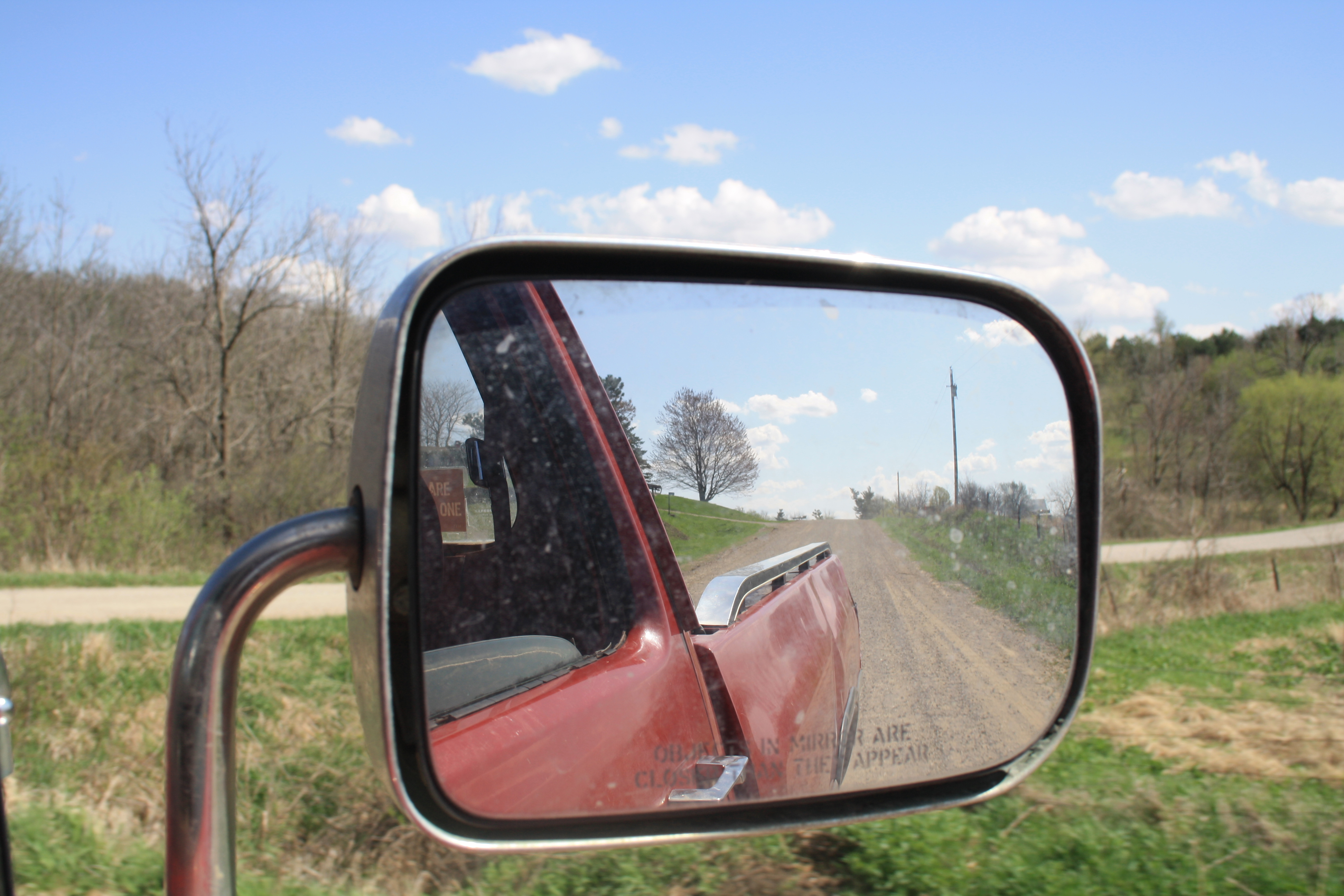
Photo by Eva Gemrich
